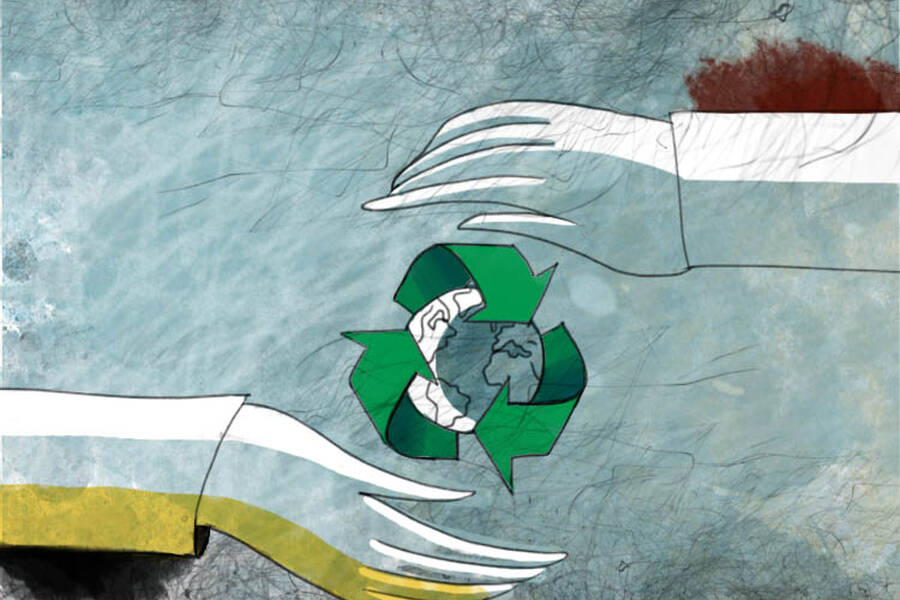Marketing Social Impact Dec 7, 2015
You Can Taste the Benevolence
If your customers know you donate to charity, will they like your products more?

Yevgenia Nayberg
Does wine taste better if you know the vintner donates to a worthy charity? Will a teeth whitener make your pearly whites look even whiter if the manufacturer funds child relief efforts?
The answer, according to new research from the Kellogg School, is yes.
Many companies engage in corporate social responsibility at least partly as a marketing effort—a way to enhance the reputation of a company’s brand. But Alexander Chernev, a professor of marketing at the Kellogg School of Management, and Sean Blair, at Georgetown University, show that knowing that a company has behaved ethically can cause customers to perceive that company’s products as performing better. They call this effect a “benevolent halo.”
“This is a different story than just saying, ‘People like the company more,’” says Chernev. “The increase in positive perception is not based on advertising. Consumers actually experience the product in a different way.”
Perception Is Reality
The researchers devised a series of experiments in which consumers were able to sample a product—such as tasting wine or inspecting the results of a teeth whitener—and evaluate its performance. For some participants, the products were presented with written descriptions of the company’s socially responsible behavior: that the company behind the teeth whitener had made sizable donations to UNICEF, for instance, or that the winery donated part of each sale to the American Heart Association.
“The increase in positive perception is not based on advertising. Consumers actually experience the product in a different way.”
Importantly, the charitable giving was entirely unrelated to the company’s core business: there is no link, after all, between teeth whitening and children’s emergency relief. Nonetheless, participants who were told about the giving consistently rated product performance higher than those who did not learn of any giving—meaning they actually experienced the wine and teeth whiteners as being of a higher quality.
Earning a Halo
Not all corporate giving is rewarded with a benevolent halo.
For one, customers need to have some uncertainty about a product’s performance—otherwise there is no need to infer information about the product based on the company’s social responsibility. In the wine-drinking experiment, participants who considered themselves to be inexperienced wine drinkers were more affected by the charitable donations than those who had more self-reported expertise.
Moreover, consumers must believe the company’s motives to be authentically benevolent, rather than merely self-interested. In another study, participants judging a charitable company’s hair-loss treatment perceived those treatments as more effective only when they believed the donations were motivated by benevolence rather than self-interest.
Finally, the halo effect is strongest for customers who believe that corporations have an obligation to act charitably. Participants who felt it was “very important” for “companies to give back to society” were more impressed by products from charitable companies than those who said corporate giving was less important to them personally.
A Better Way to Sell Snake Oil?
The results suggest that corporate generosity can generate goodwill about a company’s “character” that spills over into positive consumer experiences with its products. This increase in positive perception is all in the eye of the beholder, Chernev acknowledges, “but in reality, people tend to buy based on these perceptions.”
Of course, the irony is that the benefits to the bottom line that come with corporate social responsibility only come when companies appear to not be motivated by their bottom line. So should customers worry that companies will misrepresent their motivations in an effort to manipulate product perceptions?
“The alternative would be to try to influence consumer behavior with advertisements, without investing in any socially responsible activities,” Chernev explains.
How to Maximize the Halo
Chernev’s work suggests several practical ways for companies to benefit from a benevolent halo.
First, the company must actually be benevolent. One of Chernev’s experiments describes a technology company that would donate a percentage of its profits to charity “even in the toughest economic times because giving back to society was aligned with their values.” The company was fictitious, but Chernev’s results suggest that such behavior, if implemented in the real world, would act as a powerful signal about the sincerity of the company’s prosocial activities.
Second, communicating these prosocial motives to consumers through advertising (which is perceived as self-interested) might be less productive compared with third-party channels like social media and press releases. In other words, a company may do well to let others report on its charitable giving instead of seeking to toot its own horn.
Third, products with an uncertain value proposition—including consumer-lifestyle products, like gadgets, shoes, or clothing accessories—can gain the biggest boost from corporate do-gooderism. The same goes for fungible utility items, like housewares, since consumers may not have strong loyalty to any particular brand.
For a company with social responsibility as part of its mission, like Ben & Jerry’s, Chernev says the research argues that prosocial activity could be even more effective than previously believed, as it also boosts customer satisfaction with their ice cream.
And for companies with a more neutral attitude toward “doing good,” Chernev says, “this research gives them more reasons to invest in prosocial behavior, because it is in their self-interest.”
Chernev, Alexander, and Sean Blair. “Doing Well by Doing Good: The Benevolent Halo of Corporate Social Responsibility.” Journal of Consumer Research. 41(6): 1412–1425.



